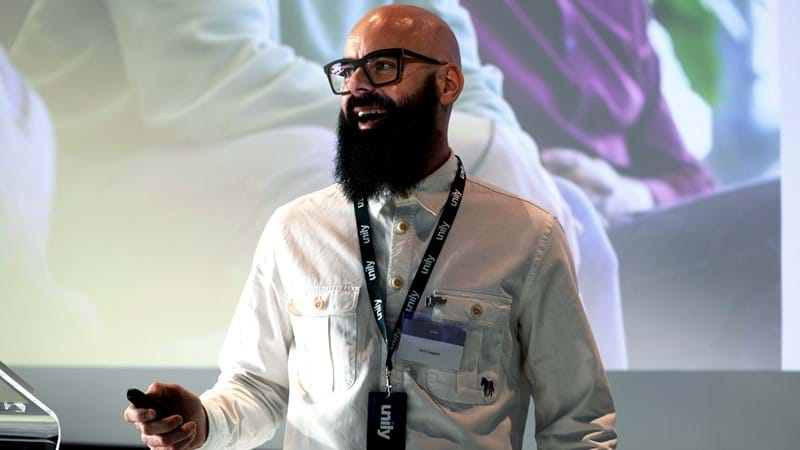The nature of work
With greater reliance on technology to do our jobs, many are calling the post-pandemic nature of work a digital age. This episode’s guests, Paul Miller, CEO and Founder of Digital Workplace Group and Shimrit Janes, DWG’s Director of Knowledge, believe that we are in a living age. They’ve joined the Unily podcast team to discuss what this means for the future of work for organizations around the world.
The nature of work has changed
COVID-19 forced organizations to adapt to new ways of working, leveraging digital tools to fuel a mass transition to hybrid work. This transition accelerated the development of processes and technology that now leave us reliant on digital tools to power work. As a result, the nature of our jobs and work as we know it has changed.
The latest episode of the Unily podcast invites Paul Miller and Shimrit Janes to introduce their new book, Nature of Work: The New Story of Work for a Living Age, and break down this new living nature of work.
Paul Miller
Paul Miller is the CEO and Founder of Digital Workplace Group and co-author of the new book Nature of Work: The New Story of Work for a Living Age. Paul has given many inspirational talks on the digital future of work for Microsoft, IKEA, Google, Accenture and Harvard Business Review, and written three books.
Shimrit Janes
Shimrit, also co-author of Nature of Work: The New Story of Work for a Living Age, is Director of Knowledge for DWG, focused on curating knowledge on the digital workplace for its members and clients such as Adobe, The Coca-Cola Company, and Ubisoft.
4 insights for a new world of work
In a new living age, how can organizations change the way they think and practice to help people achieve and thrive? The Unily team chat with Shimrit and Paul to explain why things are changing and what modern enterprises can do to align themselves with a future of work that is unlike any we’ve seen before.
#1. Organizations aren’t machines, they are alive
Society has inherited a mechanistic view of work. For the past 250 years work has been defined by output, tools, and efficiency. But work today is unlike never before, so how can enterprises continue to strive forward with an outdated view of the nature of work?
This disconnect has led Paul Miller and Shimrit Janes to reevaluate the world of work through a new lens. Taking the symbiotic relationships of forest ecosystems as an analogy for the structure of organizations, they draw parallels between the “invisible roots” of a tree and hidden aspects of a business that influence an organization’s health.
"An organization is, at its core, a community of people and relationships. So, what can we achieve by taking these new perspectives and applying that to the world of work? What change can we instigate?"
#2. This is not a digital age, but a living age
Shimrit and Paul argue that we are not in a ‘digital age’, but that digital tools are simply necessary to support a living age of work, one that is still fundamentally about people and connections but relies on technology to bring life and vitality.
Where access to the physical workplace was disrupted by the pandemic, businesses were forced to find ways to connect people through technology, and it is that need for connection that reveals the living nature of work, not the tools themselves.
"The challenge organizations face now is how to align the digital age with this living philosophy to ensure they continue to thrive long into the future, throughout various iterations and changes to work, and avoid dying out."
#3. Living organizations must find deep purpose
Shimrit comments on some of the guiding principles of the book and of their research, finding that organizations must become more flexible to better adapt and survive through change:
"We look at the lifespans of organizations and how they’re contracting over time and dying much earlier than they have done historically, versus those that are able to regenerate and evolve over time."
This is a major issue facing today’s enterprises and forms the basis of one of the key talking points of the episode, that organizations must find their deep purpose to even be able to evolve.
"By looking at nature and standing in front of a tree and asking ‘what’s the purpose of this tree?' […] there’s a sense that it has, what I call, ‘deep purpose’. Well, what’s the purpose of each organization? There’s this sense that if they can connect into deep purpose, in the same way that nature does, that this could be a really powerful way forward for organizations."
#4. Drawing from nature can inspire business decisions
Ecosystems, much like enterprises, look to achieve maximum output from the minimum input. If both organizations and ecosystems are living, then organizations should look to learn from nature to inform smarter, more efficient business decisions.
Diversity, for example, should look at biodiversity as inspiration; there are no quotas for a certain amount of species of plants in a forest, but the overall health of the forest relies almost entirely on biodiversity. In business, this can show leadership where they can encourage diversity and a variety of perspectives to improve the overall performance and health of an organization.
The group also discuss traditional, Fordian productivity metrics and their place within a living nature of work:
"These are really part of the mechanistic story that I think was successful for a couple hundred years, until it ceased to be successful. We didn’t wake up and then basically spent the last 40 or so years doing damage through it."
Shimrit contends that it is time that organizations looked beyond surface-level measurements to focus instead on less tangible but more influential factors like trust, purpose, and stewardship to improve organizational health.
"The idea of stewardship – that responsibility that we have to the land, not what the land can do for us – if we take that and then think about the world of work and we think about organizations [...] Are we trying to control the communities? Control the people? Control the outputs? Or are we thinking about stewarding relationships and what we can do to create that connection and that trust?"
Digital tools that support people, not processes
Unily is the employee experience platform that empowers people to do their best work. To find out how you can align technology with your employees for a living future of work, get in touch with an expert today.
Get started. Get your free demo.
Reinvent your intranet for the employee experience era.
-
Event















